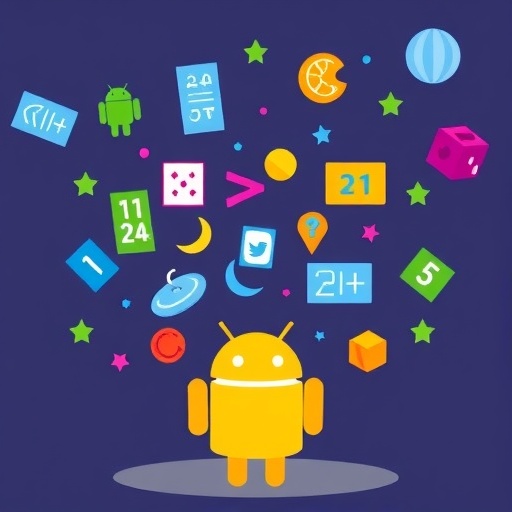The evolving landscape of education has increasingly integrated technology as a pivotal element in enhancing pedagogical practices. One of the most compelling innovations in this field is the development of educational games, particularly those based on Android platforms. These games provide interactive experiences that are not only engaging but also structured to promote critical thinking and reasoning skills among students. A recent study conducted by R.A. Pratama meticulously examines the effectiveness of such Android-based educational games in elevating students’ mathematical reasoning. This comprehensive meta-analysis serves as a pivotal resource for educators and policymakers striving to enrich educational methodologies.
Through this investigation, Pratama assesses a variety of research and development (R&D) projects that have been executed over the years concerning the deployment of Android educational games. By gathering data from multiple studies and evaluating their outcomes, the researcher presents a robust picture outlining the significant benefits and potential pitfalls of incorporating gaming into the math curriculum. The meta-analysis methodology empowers Pratama to synthesize findings from diverse educational environments, thereby offering a nuanced understanding of the variables at play.
One of the central findings of the study is the profound impact that immersive educational games can have on students’ engagement and motivation levels. Traditional teaching methods often fail to captivate young learners, leading to disinterest and disengagement. In contrast, interactive tools that incorporate gamification principles have been shown to maintain students’ attention and stimulate their desire to learn. This heightened level of engagement is crucial, particularly in subjects like mathematics, which can often appear daunting or inaccessible to many students.
Moreover, the research highlights how these gaming platforms present mathematical problems in a manner that is relatable and contextually relevant. By integrating mathematical reasoning into game mechanics, students can practice their skills within a safe and entertaining environment. This real-world application not only solidifies their understanding but also encourages experimental learning, where students feel empowered to explore different solutions without the fear of making mistakes.
The effectiveness of these educational games is further corroborated by the positive feedback received from both students and teachers. Many educators report a notable change in classroom dynamics where students who previously struggled with mathematical concepts exhibit improvements in both confidence and performance. This shift in the educational paradigm suggests that when learning is approached through a game-based lens, students are more likely to embrace challenges, thus enhancing their overall cognitive development.
Pratama’s research also delves into the cognitive skills that gaming fosters, such as critical thinking, problem-solving, and spatial awareness. These skills are not solely confined to the realm of mathematics; they permeate various aspects of life, preparing students for future academic pursuits and real-world challenges. The alignment of game content with educational standards and learning objectives ensures that the educational value is not compromised in favor of entertainment, which often is a concern for critics of gamified learning.
Additionally, the meta-analysis sheds light on the aspects of game design that are most effective in enhancing mathematical reasoning. Factors such as interactivity, feedback mechanisms, and collaborative gameplay can significantly influence how students engage with the material. Games that allow for immediate feedback help learners to recognize errors and correct them in real-time, reinforcing learning through practice and reflection.
Furthermore, there is a noteworthy emphasis on inclusivity in the design of educational games. The study suggests that these digital resources can cater to a diverse student population by accommodating different learning styles and paces. Whether through visual aids, auditory instructions, or kinesthetic action that tends to accompany movement in games, the adaptive nature of educational games ensures that all students have a fair chance of comprehending complex mathematical ideas.
As the educational landscape continues to evolve, the implications of Pratama’s findings cannot be overstated. The research serves as a critical call to action for educational stakeholders to invest in the development and integration of technology-driven learning tools. With the ongoing penetration of mobile devices in classrooms, there exists a tremendous opportunity to harness this technology to drive improvements in academic outcomes, particularly in challenging subjects like mathematics.
However, the study does not shy away from addressing the potential drawbacks and challenges that come with implementing educational games in the curriculum. Issues such as screen time, the need for teacher training, and ensuring accessibility for all students are valid concerns that require careful consideration. It is essential for educational institutions to devise comprehensive strategies that not only promote the use of these technologies but also ensure that they are effectively woven into the educational fabric.
In conclusion, the meta-analysis conducted by R.A. Pratama presents a compelling case for the effectiveness of Android-based educational games in enhancing students’ mathematical reasoning. By placing students at the center of the learning experience and facilitating a more engaging approach, the study provides valuable insights that could transform traditional educational practices. As schools look to the future, embracing this innovative blend of gaming and education may well be the key to unlocking students’ full potential in mathematics and beyond.
Subject of Research: Effectiveness of Android-based educational games in improving students’ mathematical reasoning
Article Title: Effectiveness of research and development (R&D) of android-based educational games to improve students’ mathematical reasoning: a meta-analysis approach
Article References:
Pratama, R.A. Effectiveness of research and development (R&D) of android-based educational games to improve students’ mathematical reasoning: a meta-analysis approach.
Discov Educ 4, 315 (2025). https://doi.org/10.1007/s44217-025-00486-7
Image Credits: AI Generated
DOI: 10.1007/s44217-025-00486-7
Keywords: Educational Games, Mathematics, Android, Meta-analysis, Student Engagement, Learning Outcomes, Problem-Solving, Cognitive Skills, Inclusivity.




